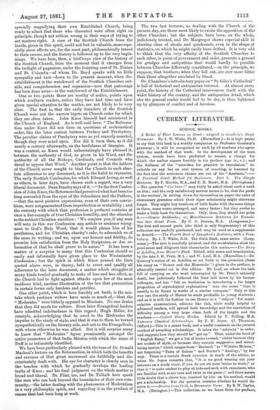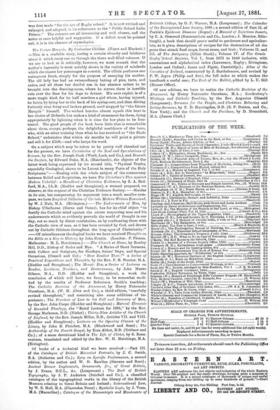CURRENT LITERATURE.
SCHOOL BOOKS.
A Series of First Lessons in Greek : adapted to Goodwin's Greek Grammar. By J. W. White, Ph.D. (Macmillan.)—It is high praise to say that this book is a worthy companion to Professor Goodwin's grammar ; it will be recognised as such by all teachers who agree with the method of that work. In the development of the verb system, moods have been preferred to tenses, a change for which the author argues forcibly in his preface (pp. iv., v.) ; and the dullness of the "exercises for practice in translation," in- evitable on any but an oral system of teaching, is lessened by the fact that the sentences chosen are out of the " Anabasis."
A Practical Greek Method for Beginners. Part I. The Simple Sentence. By F. Ritchie, M.A., and E. H. Moore, M.A. (Rivingtons.) —The question " Cvi bond ?" may fairly be asked about such a work as this ; and the only satisfactory answer seems to be, that the profit is the writers', in setting down for themselves on paper the rules of elementary grammar which their riper scholarship might otherwise forget. They might buy numbers of little books with the same things in them, some worse arranged, and many better ; but they prefer to make a little book for themselves. Only, then, they should not print it.—Graece Reddenda ; or, Miscellaneous Sentences for Transla- tion into Greek Prose. By C. S. Jerram, M.A. (Longmans.)— The first and second parts (the third is only fragmentary) of this collection are usefully graduated, and may be used as a supplement to Arnold.--The Fourth Book of Xenophon's Anabasis, with a Voca- bulary. By J. T. White, D.D. The Sixth Book, same series. (Long- mans.)—The text is carefully printed, and the vocabularies show the good-sense and diligence that characterise this series.—The Story of Achilles, from Homer's Iliad. Edited, with notes and introduction, by the late J. H. Pratt, M.A.; and W. Leaf, M.A. (Macmillan.)—De Quincey's notion of an Achilles, as set forth in the quotation (from his essay on " Homer and the Homeridao ") given in the preface, is admirably carried out in this edition. Mr. Leaf, on whom the task fell of carrying on the work interrupted by Mr. Pratt's untimely death, has judiciously followed the lines laid down by his former colleague, and has " felt no hesitation in introducing a far larger proportion of etymological explanations " into the notes " than is usually to be found in works of a similar compass." Only in this way can the study of Homer be made profitable to young students ; and as it is still the fashion to use Homer as a " subject " for matri- culation examinations, editions like this, while really helpful to advanced readers, will spread both knowledge and the conviction of difficulty among a very large class, both of the taught and the teachers.—Oxford Study Guides. Edited by F. Pulling, M.A. Entrance Classical Scholarships. By F. H. Jeyes. (J. Thornton, Oxford.)—This is a smart book, and a useful comment on the present method of awarding scholarships. It takes the "subjects" in order, and suggests how they should be " got up." Thus, under the head of " English Essay," we get a list of books to read, " either because they are models of style, or because they contain suggestive and stimu- lating matter," which ranges from " Realmah " to " Wilhelm Meister," not forgetting " Tales of Balzao " and Butler's " Analogy," by the way. There is a certain frank cynicism in much of the advice, as when Mr. Jeyes remarks that, " It is no good wearing out your trousers on a study chair, if you do not set your brains to work ;" or that it " is quite useless to play at hide-and-seek with examiners, who are familiar with every turn and twist in the game ;" and there seems little doubt that a clever boy, coached by him on his method, would get a scholarship. But the question remains whether he would de- serve it.—Stories from Ovid, in Hexameter Verse. By R. W. Taylor, M.A. (Rivington.)—This collection, as we learn from the preface,
was first made " for the use of Rugby school." It is now revised and enlarged, and adapted, in its references, to the " Public School Latin Primer." The extracts are all interesting and well chosen, and the notes at once helpful and suggestive. If a defect must be pointed out, it is in the absence of etymologies.































 Previous page
Previous page